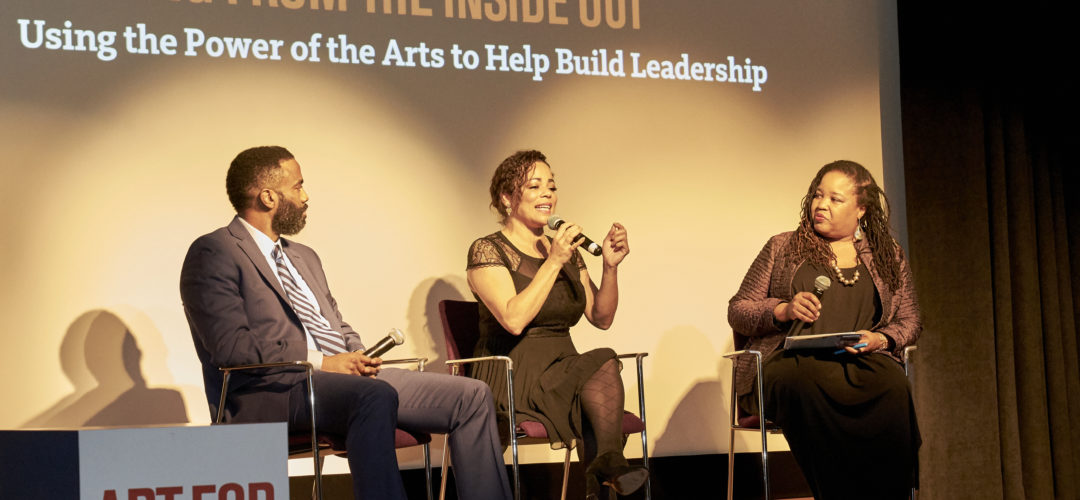Artists, Experts and Activists Share Stories and Insights at the Art for Justice Fund’s ‘Art, Advocacy, Action’ Event
February 06, 2018
On the evening of January 30, several artists, activists, donors and experts in the area of criminal justice reform gathered for an evening of conversation and insights at the Art for Justice Fund’s Art, Advocacy, Action event. Hosted by Rockefeller Philanthropy Advisors and the Ford Foundation at the Museum of the City of New York, the event showcased multiple panel discussions and performances addressing the need to change our system of mass incarceration.
The discussions featured several experts working in the area of criminal justice reform, including multiple formerly incarcerated leaders. Daryl V. Atkinson, Co-Director of Forward Justice, discussed how his experience as a formerly incarcerated person equips him with specialized knowledge to confront this issue through his work. He stressed the need for formerly incarcerated leaders to be engaged in the dialogue on criminal justice reform: “Nothing short of a social movement is going to end mass incarceration, and no social movement has succeeded without the leadership of those most affected.”
As Mr. Atkinson suggested, a major barrier to confronting mass incarceration is a lack of opportunity among those who are re-adjusting to society after prison. This was a common theme throughout the night: we need more opportunities for formerly incarcerated persons in their careers and life, for children who come from marginalized backgrounds, and for those who are currently incarcerated.
Formerly incarcerated people are often shut out of career opportunities due to prejudice and discriminatory employment practices. However, as Sabra Williams, co-founder of the Actors’ Gang Prison Project, pointed out, surviving in prison requires the same skills needed in many career roles, and we should give them the chances we would give others getting acclimated to new environments. “To survive in prison takes all the things we look for in a leader. Employing the formerly incarcerated is not easy, just as it isn’t easy to employ people just out of college. Can’t we think of these people the way we think about any intern?”
A highlight of the evening was a poetry reading by Luis J. Rodriguez, Los Angeles Poet Laureate and author of 16 bestselling books ranging genres of poetry, fiction and memoirs. Before the reading, Mr. Rodriguez shared the story of how he wrote the poem in a prison cell, after spending most of his youth in his “sanctuary,” the library. After his release, he discovered a love of writing and a new perspective on life, which he credits to his friends and mentors who took a special interest in his wellbeing. “I was not ‘scared straight,’” he said, “I was ‘cared straight.’”
It’s this kind of empathy and support that Art for Justice seeks to replicate in its programs. Throughout the night, speakers repeatedly commended the Art for Justice Fund’s innovative approach to a timely and pressing issue. Ford Foundation President Darren Walker emphasized the importance of compassion in Art for Justice’s strategy, “Projects like this are so powerful because they build understanding and empathy. As we all know, empathy is the first step to justice.”
Since the launch of the Art for Justice Fund with the initial $100 million contribution, donors have contributed an additional $8+ million, to be granted to projects that address the Fund’s five focus areas: bail reform, sentencing reform, re-entry barriers, arts programs and artists’ and writers’ ability to bear witness to these injustices.
While we still have a long way to go to solve mass incarceration, the Art for Justice Fund is proud to work alongside its supporters and grantees to utilize art to drive meaningful change. As Tanya Coke, Ford Foundation Director of Equal Justice Unit, said, “In the last five or ten years in criminal justice reform, we’ve captured minds. What we’ve not yet captured are hearts, and that is where the arts are so important – of telling the power of human redemption. The arts uniquely have the power to tell.”
For more information on the Art for Justice Fund and their programs to end mass incarceration, visit artforjusticefund.org.
Written by Melissa Blackerby of Rockefeller Philanthropy Advisors communications team.
Back to News